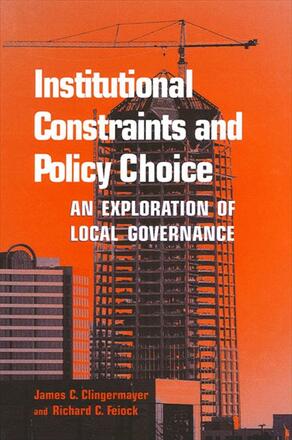
Institutional Constraints and Policy Choice
An Exploration of Local Governance
Alternative formats available from:
Demonstrates how governmental structure and institutional rules determine who gets what in American cities.
Description
Institutional arrangements constitute the "rules of the game" for any civil and political society. To understand urban politics and policy making, including issues dealing with economic development, zoning, constituency representation, government borrowing, and service contract decisions, discovering institutional regularities is key. To achieve this the authors combine older institutional approaches emphasizing formal structure and governance organizations with newer approaches and transaction cost theory. Institutional Constraints and Policy Choice contends that institutional arrangements both shape and are shaped by human behavior, and when combined with contextual factors and the uncertainty associated with leadership turnover provide the basis of understanding how decisions are made at the level of local government.
James C. Clingermayer is Assistant Professor of Political Science at Northern Kentucky University. Richard C. Feiock is Professor of Public Administration and Policy at Florida State University.
Reviews
"This book could have a profound effect on how we both study and teach local government decision making. It encourages local government scholars to once again include variables representative of local institutional arrangements in equations seeking to explain local government decision making." — J. Edwin Benton, University of South Florida
"Institutional Constraints and Policy Choice should be a standard among urban oriented graduate courses. It summarizes a broad literature and integrates the latest research and methods, and demonstrates the connection between theory, method, and hypothesis testing. It is the best book written on this topic." — Max Neiman, University of California, Riverside